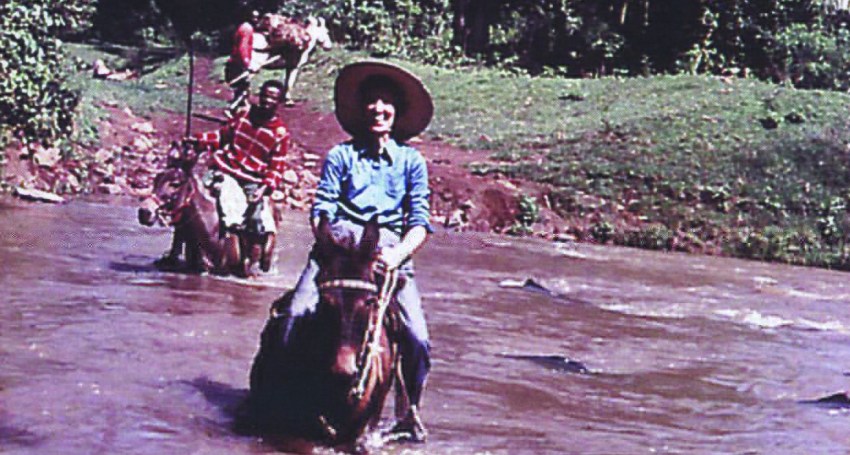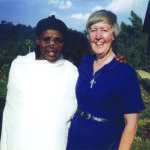The extraordinary life of Sr Maeve
People
As a young girl, Maeve O’Brien wanted to become an air hostess and travel the world. She opted for an even higher calling but that doesn’t mean she missed out on a life of adventure, as JENNY BRINKWORTH discovered when she met the inspirational Daughters of Charity Sister last month.

With a life story akin to an Indiana Jones movie script, it has taken every ounce of Sister Maeve O’Brien’s trust in Divine Providence to reach the age of 85 after serving with the Daughters of Charity for 68 years.
Her missionary exploits have taken her to the remotest regions of Ethiopia, a refugee camp in northern Congo, the malaria-infested rainforest of Cameroon and Aboriginal missions in outback Australia. From house arrest by Communist soldiers and expulsion from Ethiopia to contracting cerebral malaria, she insists that it is “Divine Providence with Mary, the angels and the saints” that has protected her throughout.
Advertisement
“I thank God for the preservation of my life, and for all those people who prayed for me,” Sr Maeve told The Southern Cross.
Now safely ensconced in the small Daughters of Charity community in Dover Gardens, she spends her days visiting the sick, volunteering for the local St Vincent de Paul Society conference, attending Mass at Seacombe Gardens and writing her memoirs and the biographies of some of her fellow Sisters.
It’s a far cry from her first posting as a 19 year old young Sister novice at Woolloomooloo, Sydney, where she served the “poorest of the poor” in an area then riddled with poverty and destitution.
“I loved it. Our principal work is visiting the poor, the sick, the abandoned, the alcoholics, the outcast people, and that’s why I loved it,” she said.
Maeve joined the Daughters of Charity as a not quite 18 year old. Educated by the Brigidene Sisters, she lived in Malvern, Melbourne, in a staunchly Irish Catholic family who were actively involved in the local Vincentian parish.
On the weekends she would ride her bike to Marillac House in Brighton, a home for intellectually disabled children run by the Daughters of Charity.
“I used take some of the children to the park for fun and games. They were mostly wards of the State whose parents couldn’t handle them and I saw the love, the affection and patience of the Sisters,” she recalled.
A self-confessed rebel at school, Maeve had planned to follow her friends into nursing (then air hostessing) but knew she would “just lead a wild life and never think about the Sisters again”.
Established in France in 1633 by St Vincent de Paul and St Louise de Marillac, the Daughters of Charity is a society of apostolic life in the Church, rather than a religious order. Simple vows are renewed every year on March 25 on the feast of the Annunciation, rather than for life, something which appealed to the spirited Maeve.
“That was a big factor,” she laughed. “I thought I’d stick it out for six months and then leave.”
But she soon discovered the “beauty of the Vincentian spirit” and each year there was “no temptation” not to go on.
“I have never had any regrets,” she said. “Doubts yes, plenty, but no regrets.”
Sr Maeve admitted it wasn’t always easy in the early years, rising at 4am every day and wearing the “winged” hat of the Daughters for 12 years.
Advertisement
There were only six in the seminary (the society’s term for novitiate) when Maeve joined the small Australian community in 1951. However, at that time it was the largest religious community in the world with 49,000 Sisters in 91 countries.
Sr Maeve came to appreciate the universality of the Daughters when at the age of 21 she was one of two Australian Sisters selected to spend six months in France, England and Ireland.
“It was wonderful, it showed me where the community was,” she said.
“In Paris I was sitting up in a big seminary room which had five tiers in it and 120 seminary Sisters.
“I sat exactly opposite an African Sister, and we stared at each other. She looked so beautiful,” she said, adding that she later met the Ethiopian Sister in her home country.
Returning to Australia, she trained as a teacher and worked at St Paul’s School for the Blind in Kew before being assigned to a mission in Ethiopia in April 1967.
Sr Maeve said the goal of being a missionary had always been in “the back of my mind”, having had a cousin who nursed patients with leprosy in the Solomon Islands.
“I wanted to serve the poorest, the most outcast,” she said. But what she learnt from one of her fellow Sisters, Gabriel Cubitt, whom she described as “the Mother Teresa of Ethiopia” was not to just serve the poor but to accept them as “friends, as sisters and brothers”.
Sr Maeve experienced this firsthand when Sr Gabriel took her to a cemetery in the Ethiopian capital Addis Ababa where lepers lived atop of tombs in makeshift shelters of branches and mud. Feeling overcome by their deformities and loss of limbs, Sr Maeve said “everything changed when Sr Gabriel came amongst them”.
 “Those disfigured faces were transformed by smiles.”
“Those disfigured faces were transformed by smiles.”
Sr Maeve said she would “never forget” her first days in Ethiopia: “It was like those fellows going to the moon, everything was turned upside down.”
But she didn’t hesitate when the chance came to go on mission to the interior Bonga Mission. Five Daughters of Charity from five continents conducted a 10-bed bush hospital and clinic, primary school for boys and girls, a kindergarten and bush domestic science for older girls. She also travelled by mule often for four or five hours to primitive bush schools in outlying villages.
Sr Maeve remembered going to a mud hut in one of the most remote villages where the children had no pens or pencils so she taught them the alphabet using sticks on banana leaves.
There were many times when
Sr Maeve prayed to St Christopher and others as she drove along treacherous mountain roads, took bumpy flights in small planes and negotiated countless checkpoints. Several times during the revolution she came close to being shot.
But armed with her guitar and her great sense of humour, Sr Maeve fell in love with the Ethiopian people and their country.
She was devastated when, in June 1978, she and two other foreign Sisters received a 24-hour expulsion order from the Communist soldiers to leave the Bonga Mission or be shot by a firing squad the next morning. With the mission 500km south-west of Addis Ababa and the soldiers initially confiscating their Land Rover, the Sisters, one of whom was 74, had to use all their ingenuity – and prayers – to escape to safety.
Returning to Australia, Sr Maeve worked among the Indo-Chinese boat people in Springvale, Melbourne, and after attending a course in Paris was sent to a refugee camp in Northern Congo.
After one year she returned to the Mother House and was missioned to India in 1984 where she worked among young girls who wanted to become Daughters of Charity.
Her work permit was reneged after 12 months and she regretfully had to leave but soon Sr Maeve was on her way to Cameroon where she accompanied French Vincentian priests as they visited prisons.
She also spent time in villages in the jungle where cerebral malaria was rife and despite taking preventative tables she contracted the often fatal disease. Sr Maeve was forced to return to the infirmary in Paris before she was fit enough to return to Australia.
While working in an outreach program for intellectually disabled girls in Melbourne, the Communist regime in Ethiopia was overthrown and Sr Maeve began praying to return.
“I was living in Fitzroy, where Mary MacKillop was born, and I prayed to her every day to get back to Ethiopia. She answered my prayer; I went to the Ethiopian Consulate and within three weeks I got my stamp in my passport on August 8, the feast of Mary MacKillop,” she said.
After three years back at the Bonga Mission, her luck at having her three-month visa renewed ran out and she went on sabbatical to Dublin, where she also visited her Irish relatives, and then returned to Australia where she spent four years at a new mission in South Hedland, Western Australia, living among Indigenous mothers and children.
“I loved every minute of that too,” she said.
Her advice to young people contemplating a vocation today is “be open to God’s plan for you”.
For information about the Daughters of Charity, phone 02 9886 8900 or visit www.daughtersofcharity.org.au.








Comments
Show comments Hide comments